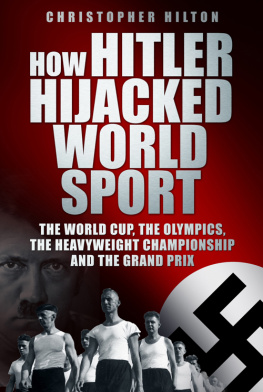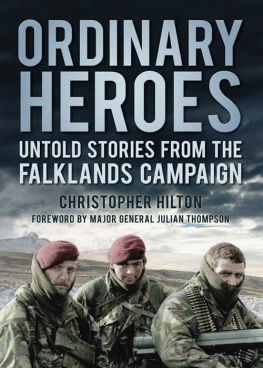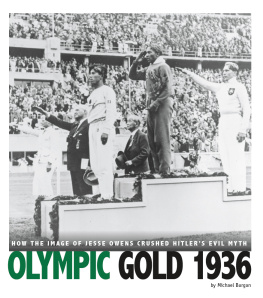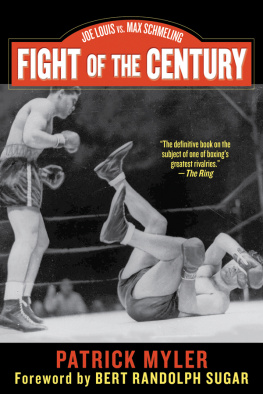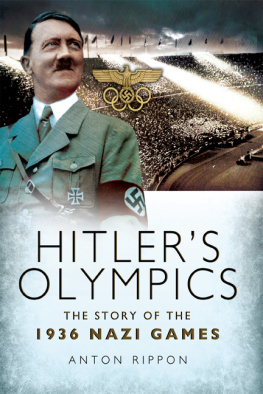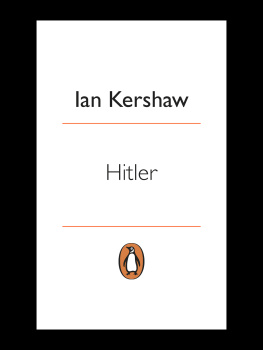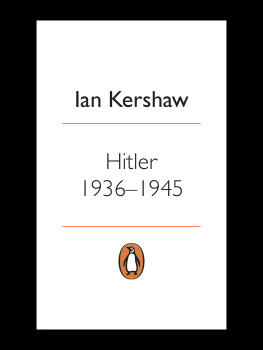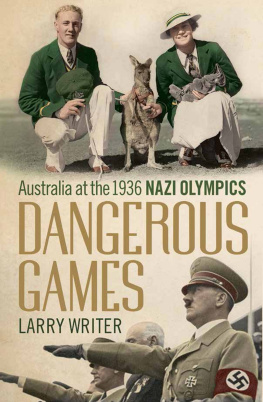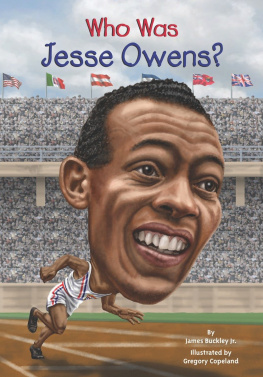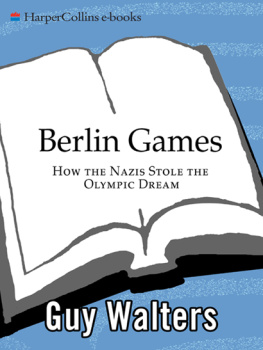
German sport has only one task: to strengthen the character of the German people, imbuing it with the fighting spirit and steadfast camaraderie necessary in the struggle for its existence.
Joseph Goebbels, Minister of Propaganda, 23 April 1933
CONTENTS
There is an inescapable reason why the Third Reich remains hypnotically fascinating even six and a half decades after it was buried. Nothing remotely like it had happened before, nothing like it has happened since and nothing like is remotely likely to happen again. The odds against the combination of circumstances which spawned it repeating themselves will always be heavily against, starting with a figure like Adolf Hitler.
In his twelve years of power he wreaked terrible havoc on many different fronts and that, by a great paradox, included the world of sport; a paradox because before he came to power he showed very little interest in it apart from racing cars and what relevance it might have in military terms. Almost from the moment he had power all that changed.
He approached sport as he approached everything else, by being prepared to exploit it in the most shameless ways as long as it served his purpose. It brought an additional paradox because sport was built on exactly the opposite principles to those Hitler and the Nazis held, if indeed you can call what they believed principles.
To say that Hitler had no grasp of any sporting ethos would be an understatement of historic proportions. As one of his generals said, I searched constantly for signs of genius and found only the diabolical.
His chilled, bloodied hand would reach deep into the Olympic movement and an Olympic Games, soccers World Cup, Grand Prix motor racing, the World Heavyweight Boxing Championship, Wimbledon and the tennis circuit, and the Isle of Man TT motorbike races. To humanise this by making a random selection, that hand would reach for sometimes fatally a cyclist and several ice hockey players, a decathlete and a fencer, two sharecroppers sons from Alabama, two tennis players (one an aristocratic homosexual, the other a Jew), an English public schoolboy and a patriotic German high jumper.
The treatment of the high jumper was most shameless of all because she held the national record but was Jewish and, rather than select her for the Olympic team, the Nazis picked a man because, being stronger, he would be sure to win. I will repeat that. The Nazis picked a man to contest the womens high jump. He did compete and, as if sport was exacting its own revenge for such a travesty, he finished fourth. You will see quite why he was able to be selected, and like so much of the Third Reich it does not make for happy reading.
Along the way, Hitlers policies created a furore across the United States, Britain, France and Sweden, who all agonised over boycotting his Olympics those in 1936 in Berlin. Bitter words were spoken and bitter accusations were made in the United States, drawing in politicians, diplomats, the Jewish community, innocent young athletes and power hunters. A chorus of voices tried to define what a free country really was, and what it should do.
Racism would never be far away, either: not just anti-Semitism but the purest kind of white supremacy, which, in turn, denigrated black people. This was unfortunate because the denigration would involve two of the very greatest athletes, Jesse Owens and Joe Louis, the sharecroppers sons.
Many individual stories have been told and it is senseless to pretend that they have not been. You can read whole books on the 1936 Olympics including mine or what the mighty German racing cars did or the life and times of the homosexual tennis player, but this book is the first, I believe, to bring all the aspects together. In that sense, most of the rich cast of characters are meeting themselves for the first time, if I can put it like that. Here, for example, you will find one of the most politically charged soccer matches ever played, where an Austrian genius publicly taunted thousands of Nazis. Again, you will see.
A word about the structure. I have re-created German sport in great detail because it is the best way to appreciate what was being done to it, and an inevitable by-product of this is that the book also becomes a history of Germanys sports matches and competitions from 1933 to 1939. The first chapter traces Hitlers rise to power across the 1920s with, interwoven, the people and events who will form the backbone of the story. I have included the main political events to give it an authentic context, although I stress that this is a book about how politics manipulated sport rather than a straightforward political book. There is a big difference.
The next seven chapters trace in chronological order what happened to sport and sports people from the moment Hitler took power in 1933. Because the impact of the Nazis was so immediate and wide reaching, the text risked darting from this sport to that all across the profusion of the summers (and winters), so to make it easier to digest I have amalgamated some of the material, breaking the strict chronological order. The seven chapters take the narrative to the moment the war broke out in 1939. As it happened, four of his mighty racing cars would be thundering round the cobbled streets of Belgrade in a Grand Prix on that very day, bringing the era to a close with, aptly, a roaring noise.
Chapter nine has the same framework as the first chapter, but pitched forward to chart what happened to all the people who formed the backbone, while chapter ten speculates about what world sport would have looked like if Hitler had won the war. Some escaped the chilled, bloodied hand. Some didnt.
I offer sincere thanks to Tommy Wahlsten (vice chairman) and Linda Sandgren of the Swedish Olympic Committee; Michal Guittard, Oprations et vnements, Direction de la Communication et du Marketing, Fdration Franaise de Tennis; Irv Osterer and Patrick Houda of the Society for International Hockey Research; David Hayhoe for raiding his library for relevant books; Mail-Pressestelle team at info@dfb.de; Gabriella Strauss of BMW; Oliver Richtberg of the DTB press office; Thomas Grmer of the Austrian Tennis Federation; Dr Gunnar Streidt of the Rot-Weiss Tennis Club, Berlin; Scott Bowers, Group Director of Communications, The Jockey Club; Birgit Kubisch-Hillebrand; Eberhard Reuss, author of the definitive Hitlers Motor Racing Battles for permission to quote, for his thoughts and for sending photographs; Robert Cellini of The Copenhagen Post ; Andy Shaw for directing me towards Eric Morse (a foreign and strategic affairs commentator at the Royal Canadian Military Institute in Toronto, who was responsible for international sports relations at Canadas foreign ministry Department of External Affairs, as it then was from 1973 to 1986); Jimmy Lindahl for researching Swedens reaction to the 1938 World Cup when their first-round opponents, Austria, ceased to exist; Sren Elbech of danskfodbold.com and Andreas Werner for help with two amazing soccer matches; Jim Hendry, MBE, Honorary Archivist, British Cycling; David Oldrey, a member of The Jockey Club and eminent horse-racing historian; Arjen Zegers of the KNVB, the Dutch FA and Timo Bootsma, a historian who found and translated invaluable material on the 1938 Holland-Germany match which never happened; Kay Crooks of the Wimbledon Lawn Tennis Museum.
The chapter titled If is about the shape of world sport assuming Hitler had won the war and represents, by definition, speculation. I am indebted to John Woodcock, Ian Cole and Linda Carlson for reading it, offering opinions, and contributing. I also owe a particular debt to James and Nancy Pinion, the co-directors of the Jesse Owens Museum in Oakville, Alabama, for providing a superb selection of photographs (taken by their friend Charlie Siefried) and daughter Marcy who sent them in high resolution. The Pinions are retired and keep the museum going on donations, gift shop sales and annual grants from the State of Alabama. They do it, unpaid, because they believe the Owens legacy should be kept alive. The museum can be accessed on www.jesseowensmuseum.org and reached at jesseowens@charter.net.
Next page
